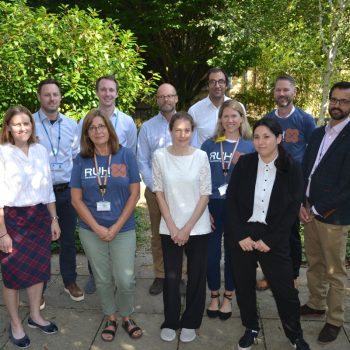The Cardiovascular research team at the Royal United Hospitals Bath NHS Foundation Trust is looking at how an innovative lifestyle intervention, called Super Rehab, could become an effective new treatment option, helping to save lives and reduce hospital procedures, while also cutting costs to the NHS.
Super Rehab is all about testing the impact of a high-level, well-resourced one-to-one support programme for patients with heart disease. It offers more than just advice, providing a tailored diet and exercise programme personalised to the individual with support to make sure the changes are practical and can become part of a daily routine.
Working in partnership with the University of Bath, and with support from RUHX, the hospital’s charity, RUH experts have already seen that this approach can be life-changing.
Super Rehab is being offered to patients earlier in the evolution of their forms of heart disease than other rehab programmes, aiming to halt its progression, help patients feel better, and potentially even reverse the disease process and turn the clock back.
If a CT scan shows that a patient is at risk of developing cardiovascular disease, or at risk of a heart attack, they will be offered the chance to join the Super Rehab programme.
Patients are offered Super Rehab in addition to standard treatments, and the research team are collaborating with researchers at the University of Oxford to track the impact using the very latest heart imaging techniques and industry partners for heart rhythm monitoring, alongside blood tests and fitness tests.
The research is starting with two studies, one for coronary heart disease and one for atrial fibrillation, involving just under 100 patients across both studies.
Dr Ali Khavandi, Consultant Cardiologist, said: “There has been an evolution in technology over the last 10 years that allows us to treat more and more complex illness and make a difference to our patients.
“Now, we have the exciting opportunity to focus back a few steps and look at what we can do to prevent patients from getting to this stage in the first place, by looking at how dietary and lifestyle changes, such as getting more exercise, can improve, or even reverse, chronic illness.”
Andy, one of the patients taking part in the Super Rehab research, said: “The programme has been a change in culture – I’m now used to regular exercise and the change in my food intake has become the norm. It’s been life-changing for me.”
As well as Consultant Cardiologist Dr Ali Khavandi, the research team includes Dr Jonathan Rodrigues, Consultant Cardiothoracic Radiologist & Honorary Senior Lecturer at the University of Bath, Prof Dylan Thompson, Professor of Human Physiology at the University of Bath, Prof Fiona Gillison, Professor of Behavioural Psychology at the University of Bath, and Dr John Graby and Dr David Murphy, Cardiology Clinical Research Fellows.
Dr Dylan Thompson, Professor of Human Physiology at the University of Bath and Co-Director of the university’s Centre for Nutrition, Exercise and Metabolism, said: “We are delighted to be working with the team from the RUH in this new collaboration.
“The potential of Super Rehab to directly benefit patients and make a difference to current treatment and care pathways is very exciting.”
Rhyannon Boyd, Head of RUHX, said: “We are elated to be supporting this unique and leading research project at the RUH, knowing that our £300,000 funding has enabled the team to establish their relationship with other academic institutions including the Universities of Bath, Bristol and Oxford, so that they can work together on their first study which focuses on coronary heart disease. We hope it will be an extra extraordinary success.”
You can find out lots more information about the Super Rehab project on the RUH website Super Rehab page and watch a video which explains what Super Rehab is all about.
